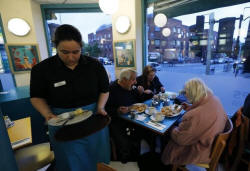|
The Markit/CIPS services purchasing managers' index (PMI) - a
closely watched gauge of the services sector - rose to 55.2 in
November from 54.5 in October, beating all the forecasts in a
Reuters poll of economists.
However, businesses reported the second-weakest level of
optimism about the future in four years, due to the unexpected
result of the U.S. presidential election, the value of sterling
and ongoing uncertainty about how Britain will leave the
European Union.
Despite a dip in the equivalent survey of manufacturers
published last week, overall the November PMIs suggest the
economy as a whole will maintain the third quarter's solid 0.5
percent growth rate through to the end of the year, Markit said.
"The pace of UK economic growth remains resiliently robust in
the fourth quarter, despite ongoing uncertainty caused by Brexit,"
said Chris Williamson, chief business economist at IHS Markit,
the company that compiles the survey.
Most economists and the Bank of England said Britain's economy
would slow sharply after June's vote to leave the EU. But strong
consumer demand and a boost to exporters from the heavy
post-referendum fall in sterling have kept growth going.
A separate survey by manufacturing lobby EEF released earlier on
Monday showed a boost in new orders and a better-than-expected
recovery in output.
Last month the Bank of England revised up its forecasts to
pencil in 0.4 percent growth for the last three months of 2016.
But it also said annual growth would slow to 1.4 percent next
year from 2.2 percent in 2016 as higher inflation squeezes
household incomes.
"Elevated price pressures and drop in expectations suggest that
a slowdown remains on the cards for next year," HSBC economist
Elizabeth Martins said. "Inflation is likely to outpace wage
growth over the coming year or so, bearing down on domestic
demand and causing growth to slow."
Businesses are already starting to feel the pinch of costlier
imports due to the fall in sterling, and Markit said business
costs had risen by the most in five-and-a-half years during the
past two months.
"These higher costs will inevitably feed through to consumers in
the form of higher prices," Williamson said.
The BoE forecasts inflation will surge to 2.7 percent next year
from 0.9 percent in the most recent data, and many
private-sector economists think it could rise even faster.
However, very few expect the BoE to reverse August's rate cut in
response. On Friday the central bank's chief economist, Andy
Haldane, warned against hasty action. BoE Governor Mark Carney
will speak on the economy later on Monday.
(Reporting by David Milliken; Editing by Jeremy Gaunt)
[© 2016 Thomson Reuters. All rights
reserved.] Copyright 2016 Reuters. All rights reserved. This material may not be published,
broadcast, rewritten or redistributed.
 |
|





